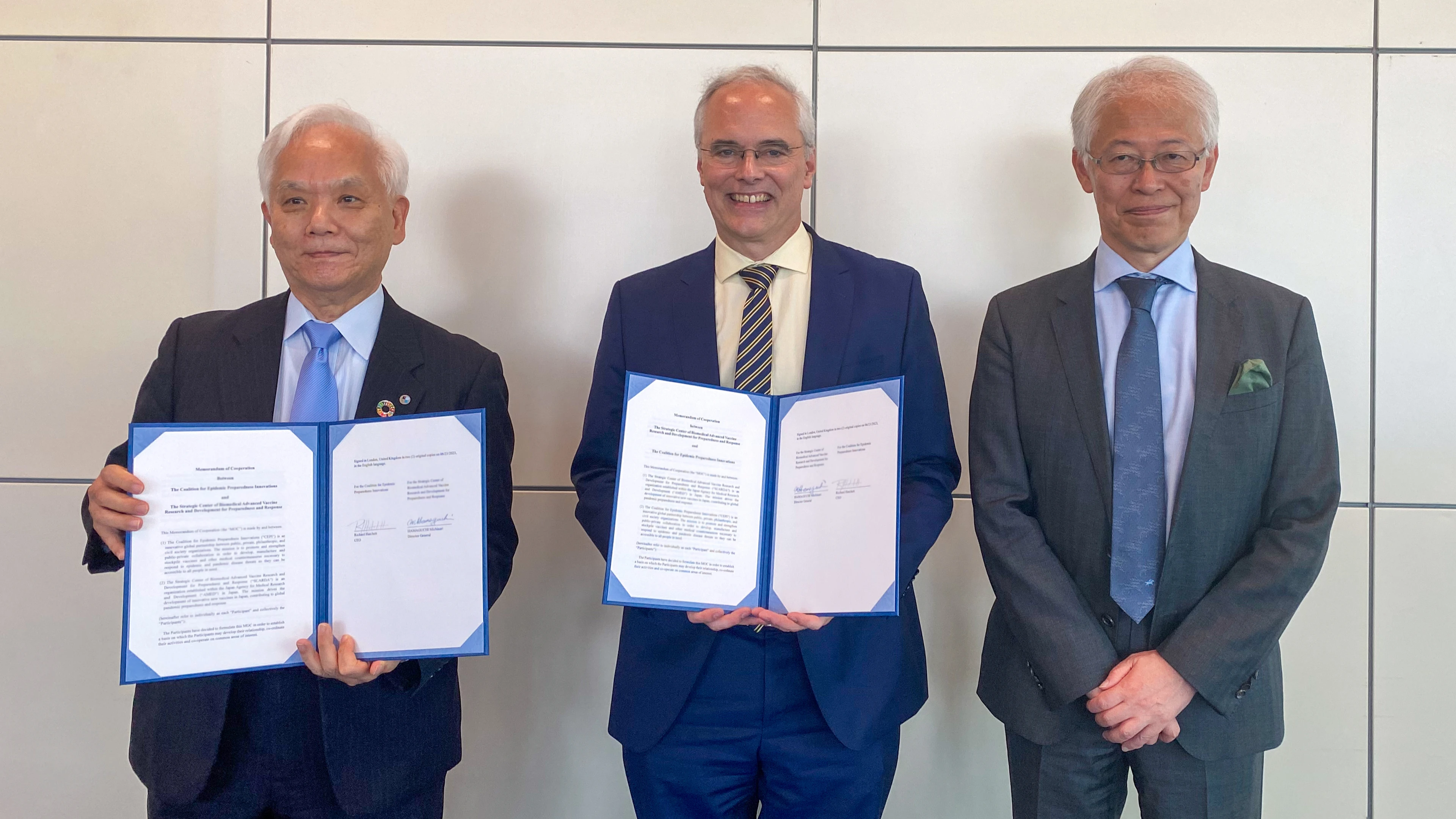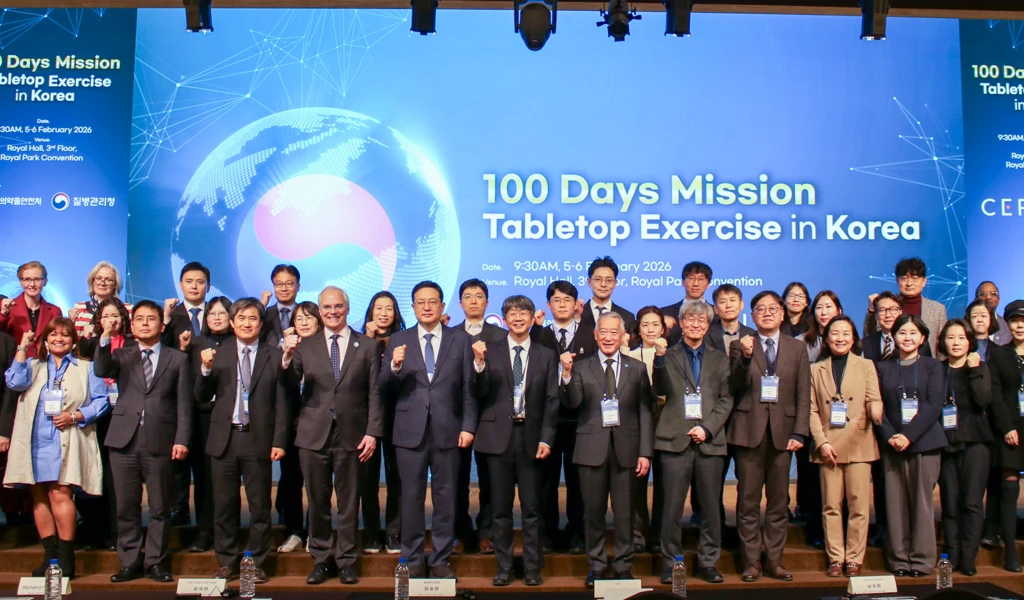Photo: Leaders of SCARDA and CEPI at the signing ceremony, witnessed by Japanese Ambassador to the UK Mr Hajime Hayashi
TOKYO, Japan/ OSLO, Norway; 26 June 2023: On June 23, the Strategic Center of Biomedical Advanced Vaccine Research and Development for Preparedness and Response (SCARDA) of the Japan Agency for Medical Research and Development (AMED) and the Coalition for Epidemic Preparedness Innovations (CEPI) signed a Memorandum of Cooperation (MOC) to strengthen collaboration between the two organizations as they strive to accelerate global preparedness and response to future pandemics. The signing ceremony took place between Dr Michinari Hamaguchi (Director General of SCARDA) and Dr Richard Hatchett (CEO of CEPI) at the CEPI office in London, UK, in the presence of Japanese Ambassador to the UK Mr Hajime Hayashi.
SCARDA and CEPI have shared missions to fund the development of vaccines against infectious diseases, so this new collaboration will enable the organizations to share expertise, knowledge and experience, and to collaborate on areas of work that contribute towards the goals of both organizations.
Through this partnership, the organizations will share information and insights on vaccine development, manufacturing, health security and other themes concerning epidemic and pandemic preparedness. The partners will collaborate on vaccine development for priority pathogens and priority virus families of mutual interest, allowing them to select and focus on complementary projects and investments without duplicating effort or resources. SCARDA and CEPI will also coordinate on activities that support the 100 Days Mission, embraced by the G7 and G20, which aims to accelerate the time taken to develop safe, effective and accessible vaccines against emerging diseases with pandemic potential to 100 days.
There are many pathogens that could cause the next pandemic and it is difficult for any one country or organization to be responsible for vaccine development for all of them. We believe that by sharing information on vaccine research and development, we can select and focus each respective projects and accelerate preparedness and response to a wider range of pathogens.
Epidemics and pandemics cannot be beaten by one agency, one country or one region alone: We must bring together the best scientific expertise and resources from around the world if we are to build the One World Vaccine Library, deliver the 100 Days Mission, and ultimately prevent the next pandemic. I am delighted to strengthen CEPI's partnership with SCARDA and ensure we are benefiting from Japan's world-leading vaccine R&D expertise in our mission to fight emerging infectious diseases.
-ENDS-
About SCARDA
SCARDA was established on March 22nd 2022 as one of the projects to implement the government's "National Strategy for Strengthening the Vaccine Development and Production System," which was compiled through the experience of the COVID-19 pandemic. SCARDA's strategy acknowledges the lack of human and financial resources for vaccine development and addresses a variety of issues that had been falling behind in vaccine development. To address this, SCARDA has two main funding programs: one to support the development o vaccines and new modalities up to Phase II clinical trials, and the other to support infectious disease research and vaccine research in academia and institutions that contributes to vaccine development. These programs aim to advance preparedness and response to the next pandemic.
About CEPI
CEPI is an innovative partnership between public, private, philanthropic, and civil organizations, launched in 2017, to develop vaccines against future epidemics. Its mission is to accelerate the development of vaccines and other biologic countermeasures against epidemic and pandemic threats so they can be accessible to all people in need.
Prior to COVID-19, CEPI's work focused on developing vaccines against Ebola virus, Lassa virus, Middle East Respiratory Syndrome coronavirus, Nipah virus, Rift Valley Fever virus and Chikungunya virus — it has over 20 vaccine candidates against these pathogens in development. CEPI has also invested in new platform technologies for rapid vaccine development against unknown pathogens (Disease X).
CEPI has played a central role in the global response to COVID-19, supporting the development of the world's largest portfolio of vaccines against SARS-CoV-2 and its variants with a focus on speed, scale and access, as well as co-leading COVAX, the global initiative to deliver fair and equitable access to COVID-19 vaccines. CEPI is also the world's leading funder of R&D for broadly protective coronavirus vaccines which could protect against future variants of COVID-19 as well as other coronaviruses with epidemic and pandemic potential.
CEPI has embarked upon an ambitious US$3.5bn five-year plan — called CEPI 2.0 — to dramatically reduce or even eliminate the future risk of pandemics and epidemics. Central to the plan is CEPI's goal — supported by the G7 and G20 — to compress the time taken to develop safe, effective, globally accessible vaccines against new threats to just 100 days. Achieving this ‘100 Days Mission' would give the world a fighting chance of containing a future outbreak before it spreads to become a global pandemic. Read the plan at endpandemics.cepi.net/
CEPI Media Contacts
E: [email protected]
T: +44 7387 055214



.webp)